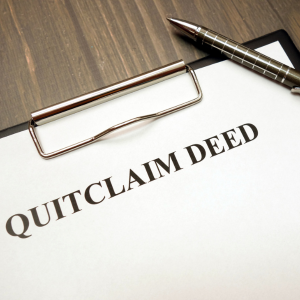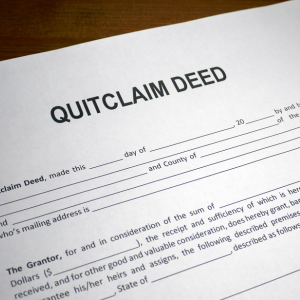
Can I Sell a House with a Quitclaim Deed in Washington?
You want to sell your home for cash in Washington, but aren’t sure if a quitclaim deed is the best option for you. When you need to use special papers like quitclaim deeds, it can be hard to figure out how to do real estate deals. It’s essential to understand what it means because its primary goal is to transfer property rights without ensuring a clear title. It is possible to use a quitclaim deed to transfer ownership of your house in Washington. This piece will talk about that. It will also list the pros and cons and suggest key considerations. This full guide has everything you need to know to make smart real estate decisions, whether you’re a landlord with years of experience or a first-time seller.
Key Highlights
- With a quitclaim deed, you can quickly give someone your property without giving them a promise. They are frequently used in Washington to relocate families or settle divorces.
- If someone wants to purchase these deeds, they should be cautious and thoroughly research them first.
- Leaves without a suit must be notarized and registered in the county to be legal. This proves that the owner has changed hands.
- Washington’s real estate excise tax applies to quitclaim deeds; however, exemptions are available for family or divorce-related transactions.
- Don’t go through what other people go through. Study the title, check the paperwork, and write according to the rules in your area.
Understanding the Basics of Quitclaim Deeds in Washington
If you live in Washington and want to use a quitclaim deed to sell your house, it’s essential to understand how it works. People often use quitclaim papers to quickly and without any guarantees change who owns property. This is usually done between family members or as part of a divorce settlement. It’s essential to understand what this method entails and how it operates in Washington state, as it may not always result in a clear title. Homeowners can easily and effectively navigate the real estate market if they understand what a quitclaim deed is and how it works in the state of Washington.
What is a Quitclaim Deed?

A quitclaim deed is a legal document used to transfer ownership of real property, including land and other real estate. A quitclaim is different from other papers because it doesn’t offer or guarantee the land or the title. It essentially informs the present owner (referred to as the grantor) that they no longer have any rights to the land. The title is not checked to see if there are any liens on it. This is why quitclaims are great when it’s clear what the donor wants and there won’t be a fight over who owns what. For instance, when family members are fighting or there is a problem with the title of a house that has already been sold.
Adding a spouse’s name to a land title or transferring property to a trust are two examples of common family moves in Washington state. They are also helpful when one partner in a split gives the other the house they owned together. Title insurance or extensive research should be considered by buyers to mitigate their risks in the event of hidden liens or claims. This is because quitclaim deeds don’t offer anything. They don’t have to worry about strange court challenges to their ownership because they know it won’t hurt it.
In family situations or when transferring property within the family, promises made in other types of deeds, such as guarantee deeds, are not as important due to the nature of trust and family relationships. This is when quitclaim papers come in very handy. If you use a quitclaim deed, potential buyers may be hesitant to purchase your house when it’s on the market. This is because they’re not sure the title is clear. This is why people who want to buy or sell land need to know what a quitclaim deed is and what it can’t do. In the right conditions, it can be very helpful if used correctly.
Implications of Using a Quitclaim Deed in Washington State
When people in Washington use a quitclaim deed, it significantly alters their ownership of land. Quitclaim deeds, on the other hand, give away the grantor’s right to the land without guaranteeing that it is valid or free of any liens. This means that the person who receives the title also assumes all the risks and potential liabilities associated with its past. For this reason, owners unfamiliar with the house’s history should give it some consideration.
You can use a quitclaim deed in Washington, and people often do so when they trust each other, such as when family members buy or sell a house together or when co-owners need to resolve title issues. To ensure the move is legal, you must complete the correct forms and submit them to the county office. Real estate excise taxes are also something you should be aware of. There may be exceptions to these taxes for moves within the same family or in connection with divorce settlements. Consulting with a tax or real estate lawyer can help you mitigate potential risks and ensure the deal is both legal and beneficial for your financial interests.
Legal Requirements for Quitclaim Deeds in Washington
You need to understand the Washington rules for quitclaim deeds so that the land can be easily transferred. It is crucial to understand the specific state laws and regulations that govern transactions of this nature. It’s also very important to follow the rules when you sign and have your title stamped. If you pay attention to these law details, it will be easier to get things done. It keeps everyone safe and makes sure that real estate contracts are easy to understand.
State Quitclaim Laws and Statutes
The Revised Code of Washington in Washington state outlines the procedures for using quitclaim papers. These rules outline the process for transferring property rights without verifying the title’s state. On the other hand, quitclaim papers only change the grantor’s interest; they don’t ensure the new owner knows who they are. You must fully describe the land, get a clear signature from the owner, and file it with the county auditor in order to follow the law. Anyone who needs to pay taxes now must pay them, rather than the person who made the move.
WA laws also make it clear how important it is to understand the real estate income tax. There may be provisions for family moves and other similar arrangements, but both parties need to be aware of any potential costs. If you talk to a real estate expert, you can be sure that all tax and legal rules are followed. This makes moving things easier and ensures that everything complies with state law.
Signature and Notarization Guidelines
There are strict rules in Washington regarding the signing and notarization of a quitclaim contract to ensure the deal is compliant with the law. It is necessary for the granter to sign and print their name below the signature to ensure there are no legal questions. This makes it clear that they freely want to pass on a property interest. This step ensures that the grantor genuinely wants to relinquish their claims to the property.
Another important step is notarization. A registered notary public must verify the signature to ensure there is no fraud and that the deed is genuine. The quitclaim deed needs to be recorded with the county after it has been notarized. This records the move in the public record as a legal transaction. The right execution, notarization, and recording will prevent disputes over property ownership and ensure the move is legal in Washington.
Process of Deed Transfer: Step-by-Step Guide
Several important steps must be taken before using a quitclaim deed to transfer property. You should know how to write and file a quitclaim deed correctly, as well as how the county keeps records of titles. These steps are crucial in Washington state to ensure that the change of property ownership is legal. Home Offer Express can help guide you through the process, from preparing and filing the quitclaim deed to understanding how the county records titles. Knowing these steps not only increases the likelihood of a successful transfer but also ensures that all legal requirements are properly met, keeping everyone protected.
Creating and Filing a Quitclaim Deed in Washington

The first step in changing land ownership is to create a quitclaim deed. Get a quitclaim deed form first. This is a formal document that allows someone to use your land without requiring any action on your part. This is where the property owner fills out the form with all the necessary information. This includes a full account of the property, the giving clause, and the name of the person who will receive the property (the grantee). Getting the move right is crucial to ensure that there are no further problems and everything is clear and in order.
The giver must complete the form and sign it in the presence of a notary public. This person ensures the move is free if the signature is genuine. The notary verifies the grantor’s name to ensure there are no scams. The title must be turned in to the county auditor’s office in the area where the land is located after it has been signed. When the transfer is recorded, the new owner is made legal and public records are kept up to date. Each county may have its own rules and fees for filing. Consult with a lawyer or the county office to ensure you’re following the rules.
Understanding County Recording Procedures
Making a quitclaim deed and getting it notarized is only the first step in transferring property. You also need to know how the county keeps records of papers. In Washington, every quitclaim deed needs to be recorded in the county where the land is located. Recording is more than just a procedure; it’s a legal requirement that allows the new owner to access public records. It’s essential to familiarize yourself with the local rules, as they may vary from county to county.
Most of the time, you need to send the signed deed to the county auditor’s office along with other forms, such as an excise tax affidavit if Washington’s real estate excise tax applies. Most of the time, you have to pay fees to file a claim. These fees change from state to state. The auditor updates the official records and notifies everyone about the move once it has been completed. In a legal sense, this record indicates that someone is the new owner and should be taken care of. You should get a copy of the recorded property that has been checked out. It can be helpful to consult with a real estate agent to ensure that all the rules are followed.
Tax Considerations: Real Estate Excise and Implications
There are tax implications to be aware of if you plan to use a quitclaim deed to sell your house fast for cash in Tacoma, WA. The real estate excise tax is one of them. Both the person who gives the property and the person who receives it must pay this tax. Knowing about tax allowances and duties can make a significant difference in the transfer of funds. When you use a quitclaim deed, you should look at estate excise tax exemptions and know what your tax obligations are. This will help the deal go quickly.
Estate Excise Tax Exemptions
In Washington state, estate excise tax breaks are a significant consideration when buying or selling a home, particularly when a quitclaim deed is used. Washington’s real estate excise tax is usually paid by the seller when they sell a house. However, there are some transactions that are exempt, which lowers the total cost. When property is transferred within a family, such as between parents, children, or relatives, tax breaks are often available. This makes quitclaim deeds a tax-efficient way to move property within families. In other cases, like when property is divided in a divorce settlement, it may also be possible.
For these exemptions, you need to show certain proof of relationships or other things that make you eligible. You should be familiar with these rules to avoid any unpleasant tax or legal surprises. Consulting with a real estate lawyer or tax expert can help you understand these rules, ensure you apply all applicable exemptions, and facilitate a smoother deal that adheres to all state laws.
Tax Responsibilities When Using a Quitclaim Deed in Washington
When you use a quitclaim deed to transfer land in Washington state, you need to know what your tax obligations are. Most transfers are subject to the real estate excise tax. There are some exemptions, but not all quitclaim deals are among them. Unless otherwise agreed, this tax is usually paid by the person who gave the gift. The tax is based on the sale price or the estimated value, and it is crucial to report everything accurately, as underreporting can result in fines or an incorrect tax amount being due. Transfers that occur through inheritance or between family members may be exempt, but they must be properly documented and comply with the state’s regulations.
A real estate excise tax affidavit that has been filled out must also be recorded with the quitclaim deed in order for the deal to be properly classified. Failing to submit the correct papers can result in delays or fines. Consulting with a real estate lawyer or tax advisor before the transfer ensures the deal’s integrity by verifying that all tax obligations are fulfilled, the paperwork is accurate, and the transfer complies with all relevant legal and financial requirements. When you use a quitclaim deed to transfer land in Washington state, you need to know what your tax obligations are. Most transfers are subject to the real estate excise tax. There are some exemptions, but not all quitclaim deals are among them. Unless otherwise agreed, this tax is usually paid by the person who gave the gift. The tax is based on the sale price or the estimated value, and it is crucial to report everything accurately, as underreporting can result in fines or an incorrect tax amount being due. Transfers that occur through inheritance or between family members may be exempt, but they must be properly documented and comply with the state’s regulations.
A real estate excise tax affidavit that has been filled out must also be recorded with the quitclaim deed in order for the deal to be properly classified. Failing to submit the correct papers can result in delays or fines. Consulting with a real estate lawyer or tax advisor before the transfer ensures the deal’s integrity by verifying that all tax obligations are fulfilled, the paperwork is accurate, and the transfer complies with all relevant legal and financial requirements.
Practical Tips for a Successful Quitclaim Deed in Washington
In Washington state, you have to pay close attention to certain property law rules when you execute a quitclaim deed. It is essential to understand when to use a claim deed and when to use a quitclaim deed. Although the quitclaim deed is straightforward, it is essential to understand the potential issues it can cause and how to mitigate them, ensuring a smooth property transfer. By examining these areas, property owners can make the real estate deal safer and smoother, thereby protecting their own interests and ensuring compliance with Washington’s legal requirements.
Evaluating When to Use a Claim Deed vs. a Quit Claim

It’s up to two people in Washington state to decide if they want to use a quitclaim deed or a different type of deed, such as a guarantee deed. Most of the time, a quitclaim deed is used when both parties are familiar with the property’s history and trust each other. This can occur when family members transfer property to each other or when estate issues need to be resolved. There are no guarantees with a quitclaim document, so you must carefully consider the land’s history and any potential title risks.
A warranty paper, on the other hand, says that the title is clear and not harmed in any way. This makes the new owner feel more at ease. However, it is more challenging to do and generally costs more. It works better for open-market deals where title security is very important. People who own property should consider obtaining a quitclaim deed and compare its simplicity and affordability to the fact that it doesn’t offer any legal protections. Check the title or consult a lawyer if you’re unsure. That way, they can escape problems they didn’t expect.
Contact us to ensure your property transfer is as safe and smooth as possible.
Common Mistakes and How to Avoid Them
If you want to quickly give someone land in Washington state, learn what the law says about a quitclaim deed. People often mess up because they don’t learn enough about the property owner. Since this type of paper doesn’t offer any protection, the grantee assumes any existing debts, claims, or encumbrances. You can obtain title insurance or conduct a title check before purchasing a house to learn about its history and potential issues.
Another mistake is making errors while doing things. They might not be able to move if there is an error in the paperwork or if the names of the people giving and receiving the money are incorrect. It might also be against the law if you don’t write the property the way the county tells you to. Because each town may have its own rules or fees, it’s important to file on time. If you consult with lawyers, you can be assured that everything you say is accurate and kept confidential. Additionally, this will help the move proceed more efficiently. In this case, everyone has sufficient financial resources and legal assistance.
Are you thinking about selling your home? Home Offer Express makes it easy. We offer fair cash offers, handle repairs, and handle all the paperwork so you can enjoy a smooth, stress-free experience. Have questions? Call (253) 600-3050 for a no-obligation consultation and see how simple selling can be.
FAQs:
What is a quitclaim deed, and how does it work in Washington?
A quitclaim deed is a legal document used to transfer ownership of a property from one party to another without any warranty or guarantee concerning the title. In Washington, it is commonly used for family transactions or divorce settlements because it allows for a swift transfer of property interest without ensuring a clear title.
Are there any risks associated with using a quitclaim deed for property transfers?
Yes, because a quitclaim deed does not guarantee a clear title, there may be existing liens or claims against the property that are not disclosed. Hence, thorough due diligence, including title research and possibly title insurance, is advisable to mitigate potential risks.
What steps are necessary to execute a quitclaim deed in Washington?
Executing a quitclaim deed involves obtaining the deed form, filling it out with a detailed property description and the names of the grantor and grantee, signing it in the presence of a notary public, and recording the deed with the county auditor where the property is located.
How does the real estate excise tax affect quitclaim deeds in Washington?
Washington’s real estate excise tax applies to most property transfers, including those done via quitclaim deed. However, exemptions may apply, such as for family-related transfers or divorce settlements. Understanding these exemptions is crucial for determining both tax liability and potential savings.
What are common pitfalls to avoid when using a quitclaim deed?
Common pitfalls include failing to conduct thorough title research, inaccuracies in the deed documentation, and not adhering to county-specific recording requirements. Ensuring precise documentation and familiarization with local procedures can help avoid these issues.
Helpful Washington Blog Articles
- Expert Strategies For Selling A Hoarder House In Washington Real Estate
- Sell Your Home Without a Realtor in Washington
- Selling A Probate House In Washington
- Fixing Up a House to Sell in Washington
- Paperwork for Selling a House by Owner in Washington
- How Long After an Appraisal Can You Close in Washington?
- How to Sell an Inherited House in Washington?
- Can You Sell a House with a Mortgage in Washington?
- Can I Sell a House with a Quitclaim Deed in Washington?
- Selling a Home That Needs Repairs in Washington
- Washington’s Capital Gains Tax After Selling a House

